Exhibit: Santa Barbara Asian American & Pacific Islander Heritage, 1870s-1970s
Miye Tachihara Ota (1918- )
Ballroom dancer, Teacher, Goleta Woman of the Year
By Holly Snyder
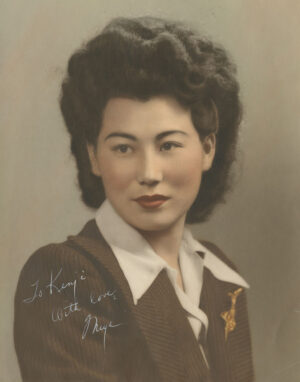
Their father broke from tradition and taught Miye to be independent and fearless
Early Life
Miyeko “Miye” Tachihara was born August 26, 1918, in Oso Flaco, San Luis Obispo County to Japanese-born Masayoshi and Hatsuki Miyamoto Tachihara. An arranged marriage with Hatsuki being a “picture bride,” they had seven children: Miyeko, Hama, Ben, John, Sam, Sueko, and Joyce Sumiko.
They moved to Oso Flaco, bought land, cleared it, made it tillable, and built their main home. Masayoshi grew mostly sugar beets. When Miye was about 5 years old, their land was taken away due to the California Alien Land Laws. The family settled in Guadalupe, California. Miye was a prosperous student and athlete at Santa Maria High School where she learned ballroom dancing.
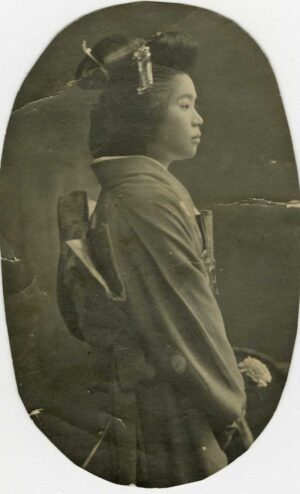
Hatsuki Miyamoto Tachihara’s picture bride portrait
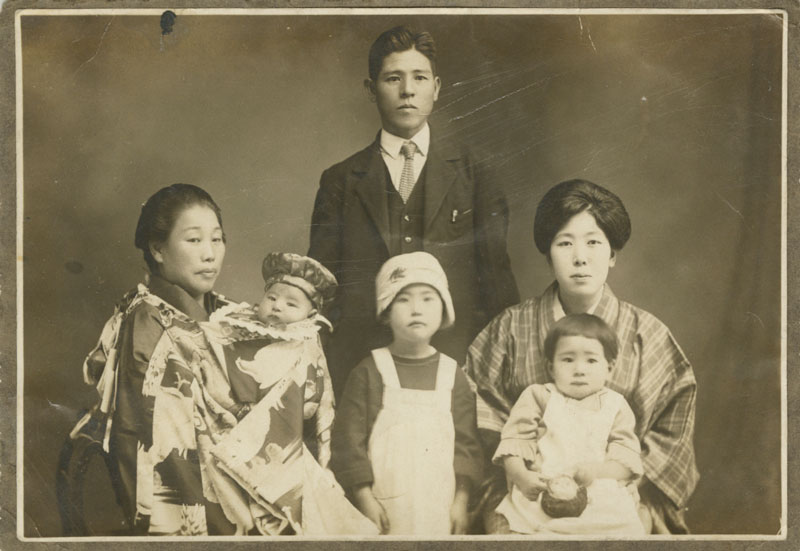
The Tachihara family
World War II
Miye was 23 years old, working as a hairdresser in Guadalupe, when Japan attacked Pearl Harbor in 1941. Listening to the news of the bombing on the radio, her family was startled when someone shot bullets into their farmhouse doors.
Miye’s father was taken on a train, with others, to Bismarck, North Dakota. The women and children were taken to the Santa Anita race track, housed in horse stalls, and then to Gila River, Arizona.
Still under construction, without electricity or plumbing, this internment camp had deep open ditches, barbed wire fences that surrounded about 50 barracks, and a watchtower.
Miye cut hair, started a girl scout group, taught ballroom dancing, and took dance lessons from Yuriko Amemiya, who later became famous. It was at Gila River that Miye met the love of her life, Kenji Ota.
Kenji Ota
Kenji Ota was born on May 14, 1923 in Lompoc, California, to Japanese-born Yasuke (also a picture bride) and Yasuke Katsuyam Ota. Kenji had three brothers and one sister: Ichiro, Ukiyo, Masaji, and Tomiye.
In Lompoc, the family lived in a house about a mile away from their farm. Kenji excelled in sports, weightlifting, and ballroom dancing at Lompoc High School. Kenji and his family were first sent to Tulare race tracks and then to Gila River.
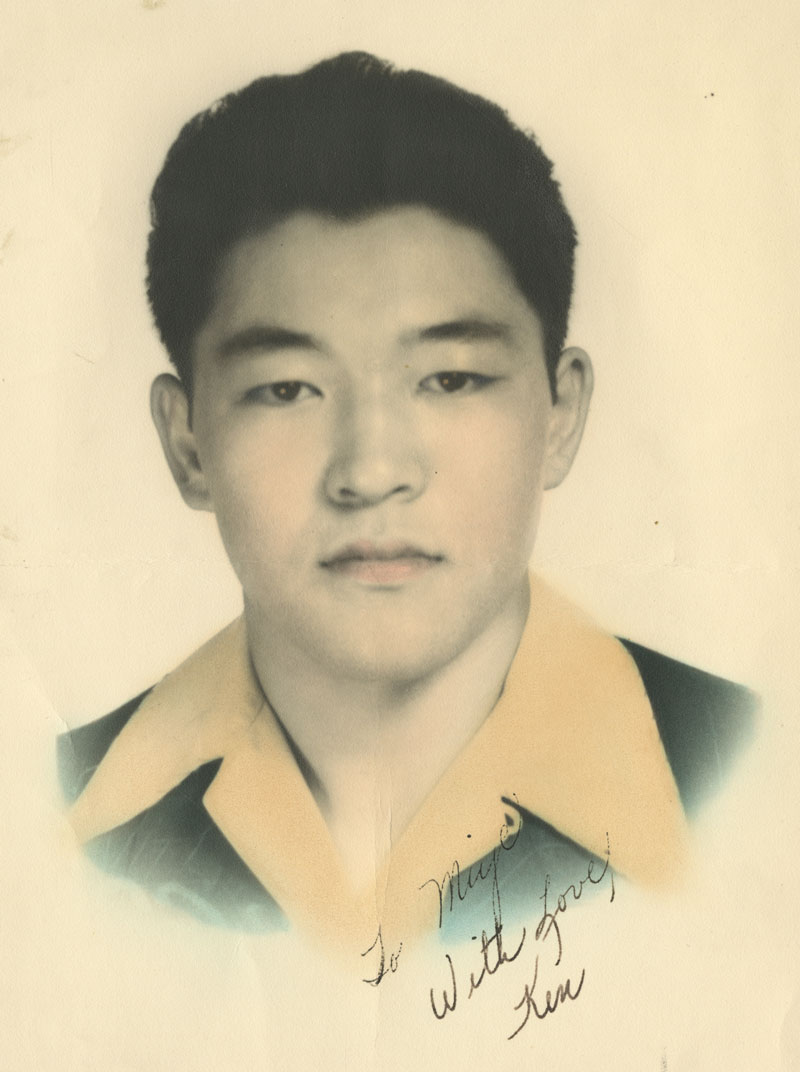
Hilton Sumida yearbook photo
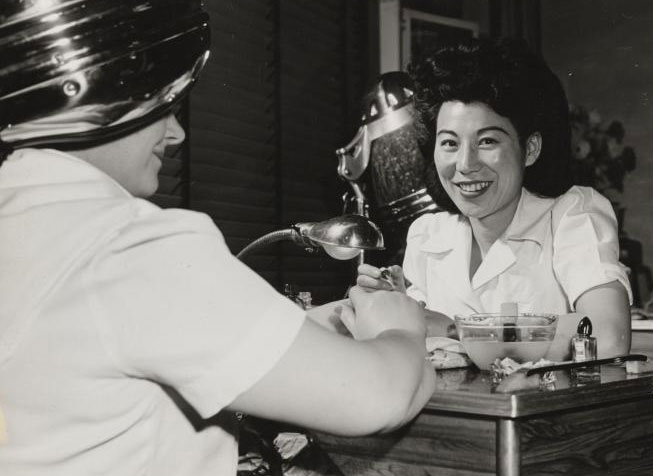
Miye Tachihara in her beauty shop
Miye and Kenji
In camp, young people often danced in the evenings listening to battery-operated radios. One night, Miye stepped into a ditch on her walk back to her barrack. Kenji caught and swooped her up. Kenji’s kindness won Miye over.
In 1943, Kenji went to work in Philadelphia. Miye joined him, they married in 1944 and Miye opened up a successful beauty shop.
Goleta
A few years later, Miye left her beauty shop to her sister Hama and returned to Santa Barbara County with Kenji. She soon identified what is now Old Town Goleta, but then “just a wide space in the road,” as the right location to buy land and open Beauty by Miye. In 1948, the same year their son Steve was born, they built their brick house by hand with the beauty shop in front facing what is now Magnolia Street. Many of her customers were from wealthy well-known families (Hollister, Bishop, and Giordano to name a few).
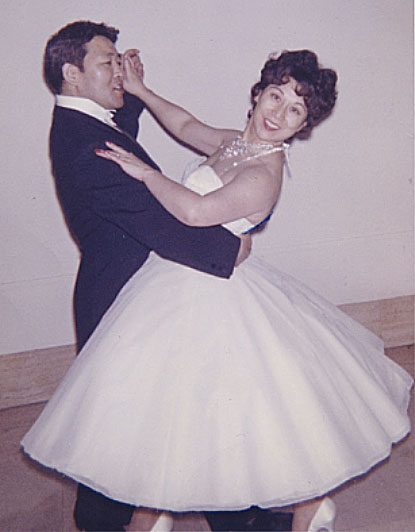
Miye and Kenji Ota
Aikido Dojo and Cultural School
The Otas joined the Arthur Murray Dance Studio and then learned from dance champions in the Los Angeles area where they frequently visited to dance at clubs and studios. Kenji became a West Coast Champion.
Kenji, a judo black-belt, first taught Steve to roll when he was a baby. Kenji and Miye both became black belts in Aikido. In 1964, when Steve was 16 years old, they built a dojo, “The Aikido Dojo and Cultural School,” adjacent to their existing home. They started teaching Steve and his friends martial arts, ki, etiquette, and ballroom dancing. Other parents soon started bringing their children to take classes. Their business grew with hundreds of students coming through their doors, making lasting relationships for 57 years. They also taught ballroom dance at the Music Academy of the West for seventeen years, and dancing and judo at UC Santa Barbara for decades. In 2021, the “Cultural School” shut its doors.
Goleta Pioneers
The Otas became pillars of the community promoting a philosophy of self-confidence, discipline, respect for others, and the importance of giving back. Miye and Kenji were named Goleta Pioneer Family in 2000. Miye, a founding member of the Goleta Chamber of Commerce and only woman on its Board, was awarded Woman of the Year in 2018 at 100 years old for her dedication to the community and entrepreneurial spirit.
Miye lost her husband in 2015 and her son in 2020. Despite her great losses, she has remained positive and lives by her energizing life force, her ki.
Acknowledgements
Interview of Miye Tachihara Ota
Sara Erickson
William Buckner
Fermina Murray
Porfirio Landeros
Ancestry.com
FamilySearch.org
SB Independent: https://www.independent.com/2020/12/09/pearl-harbor-aftermath-a-memoir-by-miye-ota/
https://www.independent.com/2018/09/04/miye-ota-is-100-years-old-and-still-kickin-butt/
https://www.independent.com/2016/02/18/kenji-ota-1923-2015/
https://www.independent.com/obits/2021/01/11/steven-ken-ota/
Noozhawk: https://www.noozhawk.com/eric_onnen_miye_ota_goletas_finest_man_and_woman_of_the_year_20181117/
